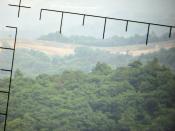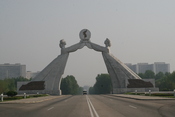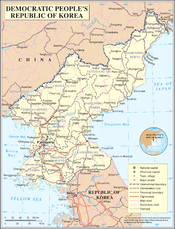The democratic People's Republic of Korea, or as commonly known as North Korea is a very interesting country. They have a form of government that is known as an "authorization socialist, or a one-man government." (Clich, 1999). This basically the equivalent of saying that all the property of the territories is owned by the state and every decision is made by a formed public committee. The people have no say or freedom to everyday life. The socialist government agenda was adopted after World War II, where as Korea split into two separate nations, South Korea, which saw truth to western government styles, and North Korea which came under the communist movement. The leader of the country for 10 years now has been Kim Chong-il. He is the son of the former dictator Kim IL-song, who was the original dictator since just after World War II.
Socially the country won't allow another form of government to come about.
The people are too scared to have a revolution in fears of a massacre. Importing and exporting food is almost none existent. The farmers can produce very little product to export due to the terrible weather like typhoons and major droughts. Also, they don't have enough resources like fuel and fertilizer. These are essential elements for the creation of food. "North Korea's communist ideology has been based on the concept of "juche," or self-reliance." (http://www.eia.doe.gov/emeu/cabs/nkorea.html) There has been a struggle to import essentials to everyday life based on this theory. Food is seen as a commodity here. There have been scares of mass starvation since the mid 90's. In response to this, other countries have tried to help out. "Nearly $300 million in food aid alone from US, South Korea, Japan, and EU in 2001 plus much additional aid from the UN...


